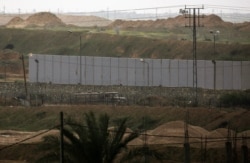Traditionally, both informed analysts and the broader public in the Arab states have taken an indifferent stance toward the outcome of Israel's increasingly frequent elections.
But with new borders envisioned by U.S. President Donald Trump's Middle East peace plan and a heightened profile for the Joint List of Israel's Arab-majority political parties — results from Monday's election are being closely watched in Amman and Cairo.
The Joint List put opposition to the Trump Plan at the top of its campaign agenda.
"Ordinary Egyptians do not care about elections in the world in general, and Israel in particular," said Saeed Okasha, in-house Israeli affairs analyst for the quasi-governmental Al-Ahram Center for Political and Strategic Studies.
Nightmare scenario
"But while the political class here may dream of losing [Prime Minister Benjamin] Netanyahu because he represents extremism and aggression toward Arabs and Palestinians, Egyptian official experience with the [Netanyahu's] Likud Party has been positive from the signing of the peace treaty of 1977 until this day," Okasha explained.
Any prospect that Israel's Palestinian population might summon sufficient power to prevent Netanyahu from forming a government is a nightmare political and security scenario for Cairo officials.
"I believe that the Palestinian representatives in the Knesset do not play a role in [promoting] Arab-Israeli ties but rather, on the contrary, they attack it," said Sara Sherif, Israeli affairs editor at the Cairo daily Al-Dustour. "I see that relations improved because of Netanyahu."
Sherif noted that after the Egyptian armed forces' 2013 ouster of President Mohamed Morsi, the Netanyahu government asked Washington not to cut aid to Egypt.
Cairo credits the right-wing Israeli leader for convincing the Obama administration in 2015 to lift its hold on the supply of 12 Lockheed Martin F-16 fighter jets, 20 Boeing Harpoon missiles, and up to 125 M1A1 Abrams tank kits for Egypt.
"There is a good relationship between the Netanyahu government and the Egyptian regime," said Sherif. "They cooperate on several vital files including terrorism in the Sinai and [East Mediterranean] gas development, and I believe that Netanyahu's continued rule will increase the stability of ties between our two countries."
Last month, Egypt began importing gas from Israel's offshore gas field, Leviathan, a step Cairo hopes will help it become a regional energy hub.
A company controlled by Egypt's General Intelligence Service has a substantial stake in the pipeline operator, and the remaining half ownership is divided between Texas-based Noble Energy and Israel's Delek Drilling company.
Impact on Gaza, Jordan
"Cairo likes the status quo, and the idea of leadership reshuffle becomes a source of discomfort in how to handle issues including the situation in Gaza and the peace process in general," said Mohammed Soliman, non-resident scholar at the Middle East Institute in Washington.
In recent weeks, Egypt started the work of building a new concrete wall along its 12-kilometer border with Gaza.
The structure strongly resembles those built by Israel and aims to stop the smuggling of arms and infiltration attempts by anti-Sissi Islamist groups into the Sinai peninsula.
Known entity
"In some ways, Netanyahu opened the door between the Egyptian regime and the current American administration," said Mkhaimar Abusada, a political scientist at al-Azhar University in Gaza. "The Egyptians believe they will benefit, at least economically, from Trump's Deal of the Century."
"Cairo is more comfortable dealing with Netanyahu who they have known for years, unlike Benny Gantz, who has no political experience and doesn't know what to do with Gaza, the Palestinians and the wider Arab World," Abusada said.
The Trump peace plan calls for the disarming of the Islamist group Hamas, which currently governs Gaza and allocates desert territory near the strip to compensate the Palestinians for the loss of about a third of the land in the West Bank, much of it along the Jordanian border.
Promises of an imminent post-election annexation of the Jordan Valley unnerves officials in Amman.
"It's pushing things in the wrong direction, and we can not be anything other than totally opposed," said Jordanian Prime Minister Omar Razzaz in an election-eve interview with CNN's Becky Anderson. "Today, we are at the lowest level of the relationship [with Israel] since the signing of the peace treaty."
The director of Amman's Center for Israel Studies, Dr. Abdullah Swalha, said he hopes the annexation rhetoric will die down once Jerusalem establishes a governing coalition — a process that could take months.
"Netanyahu has other things to worry about, including his upcoming court case and the gaps in his budget," said Swalha.
"Also, I think he may reconsider his plans for the Jordan Valley, which complicates an only partially successful effort to normalize Israel's relations with the Arab World — particularly with the states in the Gulf," Swalha said.







